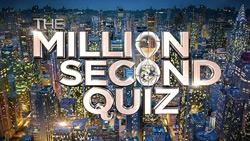
After watching the first four televised hours of NBC’s “The Million Second Quiz,” I find I don’t have very many good things to say about it. But I’m going to start this
blog entry off on a positive note and point out something good about the network -- something I haven’t seen any other writer, reviewer, blogger or tweeter mention during the last couple of
days.
On Wednesday, the 12th anniversary of the terrorist attacks of September 11, 2001, NBC telecast two hours of live entertainment programming from New York City. The third installment of
“The Million Second Quiz” was followed by that night’s presentation of “America’s Got Talent.” The full impact of that double-play didn’t really hit me until
the end of “MSQ” when host Ryan Seacrest, on split screen, ended his show and turned the network over to “AGT” host Nick Cannon.
advertisement
advertisement
“MSQ” was televised that
night, as it has been most nights, from a rooftop in the Clinton neighborhood of midtown Manhattan. (On Thursday, bad weather forced the production indoors.) As always, it featured sweeping views of
the city in the background, with many structures lit up in spectacular fashion. Off behind what is known as the Money Chair (where the hot contestant of the moment sits and rakes in $10 per second,
even during commercials) one could see the Empire State Building fittingly illuminated in red, white and blue.
At the end of the hour, Seacrest
“tossed it” (as TV personalities like to say) to Cannon, who was stationed over at Radio City Music Hall for “AGT.” For some reason at that moment I flashed on the October 2,
2001 concert “Come Together: A Night for John Lennon’s Words and Music” -- a grand affair at Radio City that was organized well before the events of 9/11, and like most events at
that time, could have been cancelled or postponed. But it wasn’t, and it was one of the first signs that the city as most of the country knows it was going to survive and once again thrive.
The point is, it was almost impossible on the night of September 11, 2001 -- and for a long time thereafter -- to imagine that at some time in the future a major broadcast network would televise
two separate live entertainment series from striking locations in midtown Manhattan. So let’s give credit to NBC. More than any other entertainment company, this network consistently showcases
New York City in a way no others do. From four hours of “Today” every Monday-Friday, to the live telecasts of “MSQ” and “AGT,” to “Saturday Night Live”
and “Late Night with Jimmy Fallon” and the move early next year of “The Tonight Show” back to the city in which it began, it’s wonderful to see.
As for
“MSQ,” after the first four nights I’m not all that impressed. It’s not as bad as some critics are insisting, but it’s nothing special, either. I would call it an okay
time-waster, which is probably not something NBC wants to hear. With all its stops and starts and double-plays and counters and line-jumpers and showdowns, it took me a night or two to figure out what
was going on. I’m still not sure I can easily explain it to people, at least not in a way that would compel them to watch.
It appears that Ryan Seacrest has finally found a television
gig he isn’t particularly good at. His ability to keep everything moving along and remain in good cheer while doing so is undeniably impressive, but the end result is that he talks too fast, too
loud and too much. It doesn’t help that he has to keep explaining what’s going on over and over again. That may be the nature of this beast, and it may have as much to do with the
show’s producers and directors as anything else, but I think a calmer, quieter host might make for a more inviting hour.
The real problem here may be that there is no suspense from night to
night, because the player that the television audience becomes invested in on Thursday is out of the Money Chair by Friday, at which point he or she is either tucked away with three other finalists in
Winner’s Row (where they devour NBC-delivered media content and sleep in weird little pods) or out of the game altogether. Unless the viewer has been obsessively following “MSQ”
online (where it continues around the clock between telecasts) he or she has missed the drama of a favorite player finally leaving the chair. Those moments are reviewed on the next night’s
telecast, but where’s the fun in that? Interactivity has never felt less rewarding.